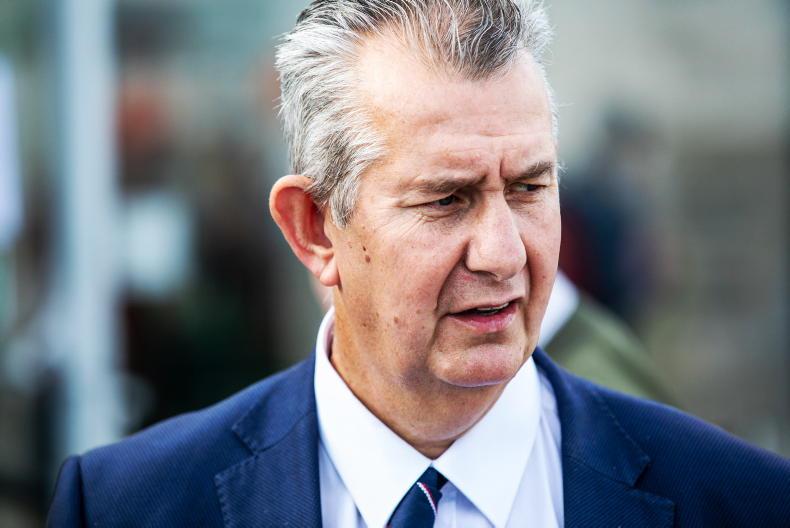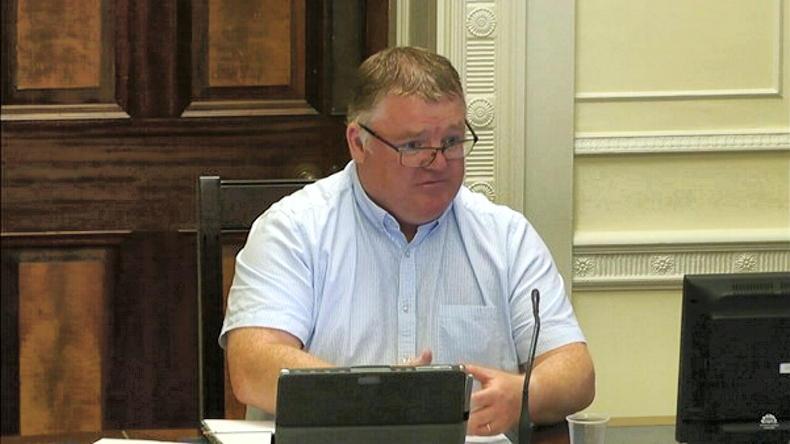Former Agriculture Minister Edwin Poots has faced a backlash in recent days from critics of the DUP over reports he tried to dilute parts of the NI Protocol Bill.
The bill, which is currently going through Westminster, would give UK government ministers the power to over-ride parts of the post-Brexit arrangements affecting NI. The controversial legislation might clear the path for a DUP return to Stormont, but risks putting further strain on relations between the EU and UK.
In a story in the Financial Times, the newspaper revealed that during his tenure as Minister at DAERA, Edwin Poots had written to the then Defra Secretary George Eustice, highlighting concern about future payments to farmers.
In particular, Minister Poots said it was “unacceptable” that under the terms of the NI Protocol Bill, NI would have to accept the same agricultural subsidy regime as the rest of the UK.

Former DAERA Minister Edwin Poots \ Philip Doyle
Under the current post-Brexit arrangements, NI can formulate its own agricultural policies, but must operate under the EU’s state aid regime. These state aid rules are designed to ensure a level playing field in terms of payments to farmers etc across Europe.
However, a clause within the NI Protocol Bill would remove NI from EU state aid and instead bring it fully under the UK’s subsidy control regime. A UK Subsidy Control Act is due to come into full force on 4 January 2023, which provides a new framework for how subsidies should be administered in the UK.
Future policy
This is potentially a significant issue for policymakers in DAERA, who over the last few years have been working on future agricultural policy arrangements for NI on the basis that NI would be under EU state aid rules.
In March 2022, DAERA announced various policy decisions, which included targeting £50m of the direct payment budget at new beef schemes. It is a policy which Minister Poots had strongly advocated when he came to office in January 2020.
It is not clear what the exact implications are if NI comes under UK subsidy controls, but given the raft of principles and transparency requirements set out in this legislation, it would inevitably delay the rollout of new arrangements for farmers in NI.
There may also be less flexibility for DAERA to implement new schemes targeted at a specific sector such as beef.
What is the NI Protocol Bill?
The NI Protocol Bill was introduced to the House of Commons in June 2022, and is now at report stage in the House of Lords, so it is nearing completion.
The legislation would allow UK government Ministers to change parts of the NI Protocol. It is the post-Brexit arrangement that keeps NI in the EU single market for goods, but also creates a trade border for goods coming in from Britain.
Among the key issues within the bill is the clause that would give ministers power to implement so-called red and green lanes at entry points to NI. Where goods from Britain are destined for sale in NI, they would not face any checks (green lane), but if the goods are destined for the EU (Republic of Ireland), these checks would remain in place (red lane).
There is also a clause which allows NI business to choose whether they want to operate to UK standards or EU standards (a dual regulatory regime).
UFU sets out position on NI Protocol
While agri-food processors, and dairy co-ops in particular, have consistently argued that the NI Protocol works for them as it facilitates unfettered access to the EU, there is wider recognition that it has created difficulties for businesses
moving goods to NI from Britain.
Perhaps of most immediate concern is the provision of veterinary medicines and animal vaccines from Britain to NI after 31 December 2022, when a grace period runs out.
In addition, farmers continue to experience significant challenges moving plant protection products, seeds and livestock into NI, while seed potatoes from Britain remain banned.
Briefing paper
Those issues are covered in a briefing paper produced by the Ulster Farmers’ Union (UFU), where the organisation highlights the positives and negatives, but concludes that it cannot support full implementation of the Protocol as it currently stands.
However, the UFU also does not believe that the NI Protocol Bill is a solution, and is critical of the dual regulatory regime as proposed, warning that it will create a two-tier market in the UK, and add to bureaucracy for industry.
UFU solution
Instead, the organisation wants to see the UK and EU putting in place an agreement on animal and plant health standards (sanitary and phytosanitary (SPS) measures), which would do away with the vast majority of checks on goods moving between the UK and EU.
The UFU briefing paper points out that NI was promised the “best of both worlds” in Brexit negotiations, but this has not been delivered, and is critical of local politicians for “political point scoring” over the Brexit issue.
“NI politicians should show consensus in supporting a SPS/veterinary agreement as it is in NI’s best interest.
“This will eliminate not all, but many of our concerns,” states the UFU document.
Read more
Decisions made on future NI farm support
Vets warn UK-EU negotiators on NI protocol
Former Agriculture Minister Edwin Poots has faced a backlash in recent days from critics of the DUP over reports he tried to dilute parts of the NI Protocol Bill.
The bill, which is currently going through Westminster, would give UK government ministers the power to over-ride parts of the post-Brexit arrangements affecting NI. The controversial legislation might clear the path for a DUP return to Stormont, but risks putting further strain on relations between the EU and UK.
In a story in the Financial Times, the newspaper revealed that during his tenure as Minister at DAERA, Edwin Poots had written to the then Defra Secretary George Eustice, highlighting concern about future payments to farmers.
In particular, Minister Poots said it was “unacceptable” that under the terms of the NI Protocol Bill, NI would have to accept the same agricultural subsidy regime as the rest of the UK.

Former DAERA Minister Edwin Poots \ Philip Doyle
Under the current post-Brexit arrangements, NI can formulate its own agricultural policies, but must operate under the EU’s state aid regime. These state aid rules are designed to ensure a level playing field in terms of payments to farmers etc across Europe.
However, a clause within the NI Protocol Bill would remove NI from EU state aid and instead bring it fully under the UK’s subsidy control regime. A UK Subsidy Control Act is due to come into full force on 4 January 2023, which provides a new framework for how subsidies should be administered in the UK.
Future policy
This is potentially a significant issue for policymakers in DAERA, who over the last few years have been working on future agricultural policy arrangements for NI on the basis that NI would be under EU state aid rules.
In March 2022, DAERA announced various policy decisions, which included targeting £50m of the direct payment budget at new beef schemes. It is a policy which Minister Poots had strongly advocated when he came to office in January 2020.
It is not clear what the exact implications are if NI comes under UK subsidy controls, but given the raft of principles and transparency requirements set out in this legislation, it would inevitably delay the rollout of new arrangements for farmers in NI.
There may also be less flexibility for DAERA to implement new schemes targeted at a specific sector such as beef.
What is the NI Protocol Bill?
The NI Protocol Bill was introduced to the House of Commons in June 2022, and is now at report stage in the House of Lords, so it is nearing completion.
The legislation would allow UK government Ministers to change parts of the NI Protocol. It is the post-Brexit arrangement that keeps NI in the EU single market for goods, but also creates a trade border for goods coming in from Britain.
Among the key issues within the bill is the clause that would give ministers power to implement so-called red and green lanes at entry points to NI. Where goods from Britain are destined for sale in NI, they would not face any checks (green lane), but if the goods are destined for the EU (Republic of Ireland), these checks would remain in place (red lane).
There is also a clause which allows NI business to choose whether they want to operate to UK standards or EU standards (a dual regulatory regime).
UFU sets out position on NI Protocol
While agri-food processors, and dairy co-ops in particular, have consistently argued that the NI Protocol works for them as it facilitates unfettered access to the EU, there is wider recognition that it has created difficulties for businesses
moving goods to NI from Britain.
Perhaps of most immediate concern is the provision of veterinary medicines and animal vaccines from Britain to NI after 31 December 2022, when a grace period runs out.
In addition, farmers continue to experience significant challenges moving plant protection products, seeds and livestock into NI, while seed potatoes from Britain remain banned.
Briefing paper
Those issues are covered in a briefing paper produced by the Ulster Farmers’ Union (UFU), where the organisation highlights the positives and negatives, but concludes that it cannot support full implementation of the Protocol as it currently stands.
However, the UFU also does not believe that the NI Protocol Bill is a solution, and is critical of the dual regulatory regime as proposed, warning that it will create a two-tier market in the UK, and add to bureaucracy for industry.
UFU solution
Instead, the organisation wants to see the UK and EU putting in place an agreement on animal and plant health standards (sanitary and phytosanitary (SPS) measures), which would do away with the vast majority of checks on goods moving between the UK and EU.
The UFU briefing paper points out that NI was promised the “best of both worlds” in Brexit negotiations, but this has not been delivered, and is critical of local politicians for “political point scoring” over the Brexit issue.
“NI politicians should show consensus in supporting a SPS/veterinary agreement as it is in NI’s best interest.
“This will eliminate not all, but many of our concerns,” states the UFU document.
Read more
Decisions made on future NI farm support
Vets warn UK-EU negotiators on NI protocol









SHARING OPTIONS